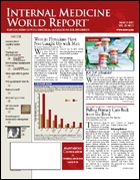HPV Infection plus Cigarette Smoking-A Deadly Combination
Cervical Cancer Risk Increases by 27-Fold
Cancer Epidemiol Biomarkers Prev
Women who smoke while concurrently being infected with high levels of the human papillomavirus (HPV) increase their risk for cervical cancer by as much as 27-fold, show results of a new study (. 2006; 15:2141-2147). HPV infection and smoking have long been independently linked to cervical cancer, but this is the first study to show the synergetic effect between these 2 entities.
Investigators reviewed Pap smear data of 105,760 Swedish women: 449 had noninvasive cervical cancer in situ; 499 women without cancer served as controls. Smoking was compared with HPV type 16 (HPV-16), the strain most often linked to cervical cancer.
The combination of high viral loads and smoking was most strongly associated with a diagnosis of cervical cancer, but other findings were also significant:
? Women who smoked and had a high HPV-16 load at their first Pap smear had a 27-fold increased risk of cervical cancer in later years compared with smokers who were not infected with HPV
? Women who smoked and were positive for HPV-16, but with low viral load, had a 14-fold greater risk than women who smoked but were HPV-16-negative
? Nonsmokers with high HPV-16 loads had a 6-fold increased risk for cervical cancer compared with HPV-negative nonsmokers.
"We were surprised to see this dramatically increased risk among women with high viral loads who smoked," said lead investigator Anthony S. Gunnell, MD, of Stockholm University, Sweden. "Our initial analysis centered on whether smoking was an independent risk factor for cervical cancer. Clearly, both exposures need to be present at the same time for there to be interaction."
Dr Gunnell explained, "We found a statistically significant multiplicative interaction between smoking duration and HPV presence causing cervical cancer?.One explanation for this interaction could involve the influence of smoking on persistence of HPV infection, probably due to localized immune suppression. Conversely, it could be related to the progression of neoplastic growth, since HPV and smoking appear to alter the levels of certain cytokines which are involved in controlling abnormal cell growth. More likely, both mechanisms are contributory factors."
The study, which may also help explain why some women may not get cervical cancer despite smoking or being HPV-positive, did not include enough women with high viral loads to determine whether smoking and HPV, by themselves, caused the disease. But since it was one of the largest studies to have examined this relationship, results strongly suggest the direction for future research on causation.
Key points
? New evidence suggests that having HPV infection while smoking increases the risk for cancer many times.
? HPV-16—positive women who smoke are at a 14- to 27-fold increased risk of cervical cancer compared with either risk factor alone.
? Physicians should caution HPV—positive women to avoid smoking.
